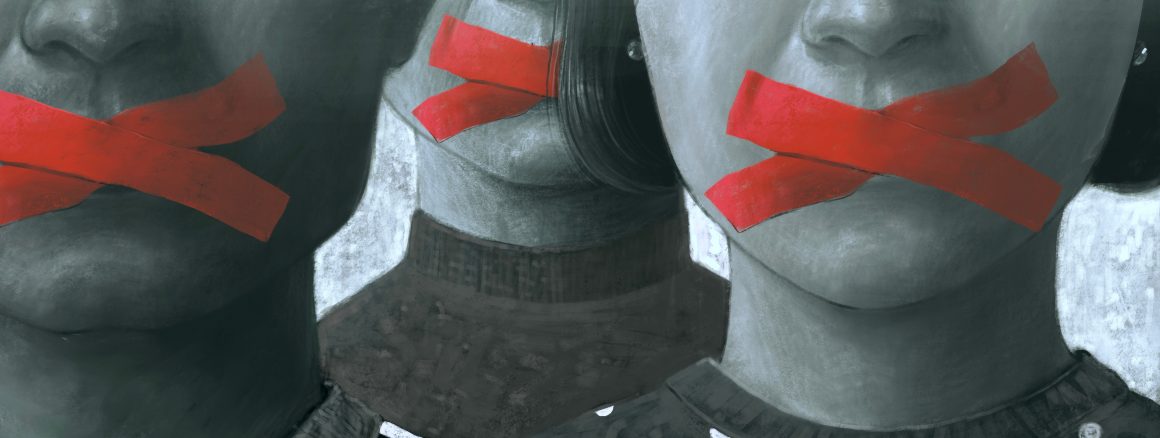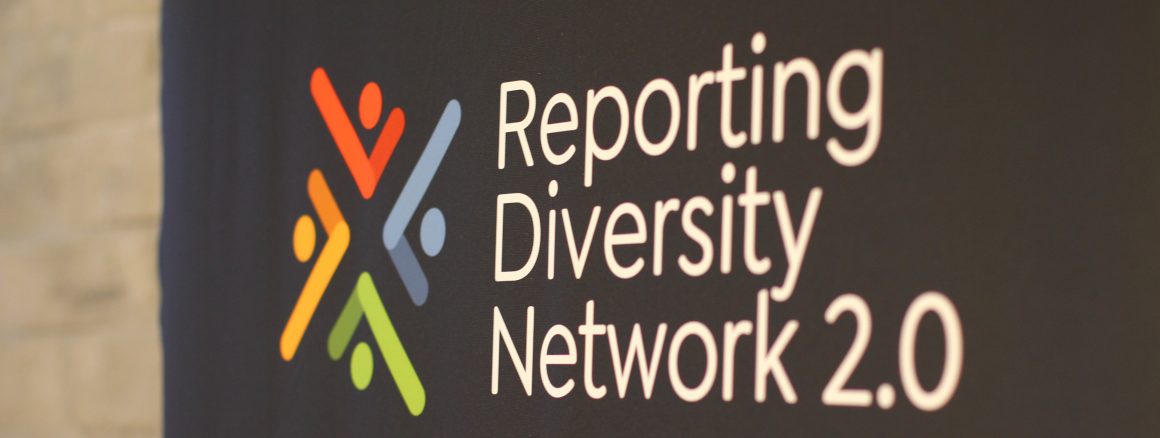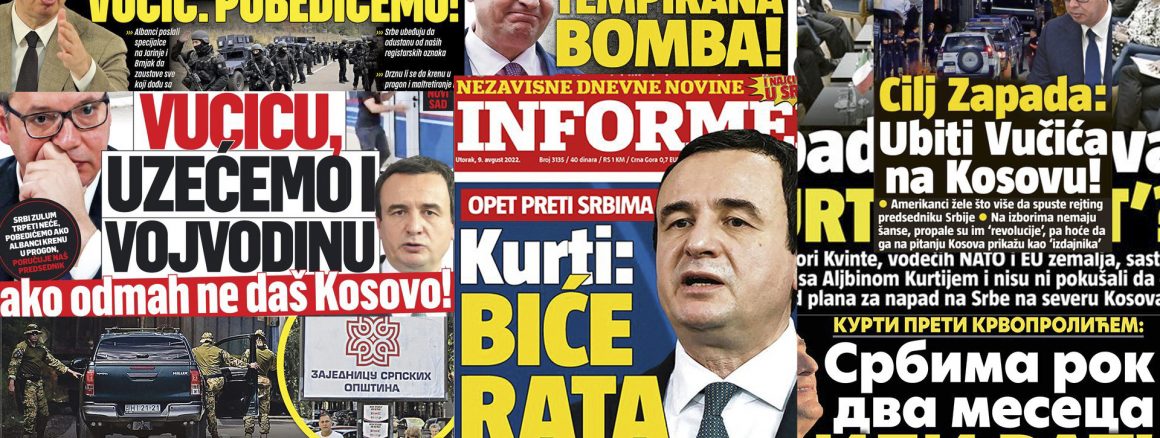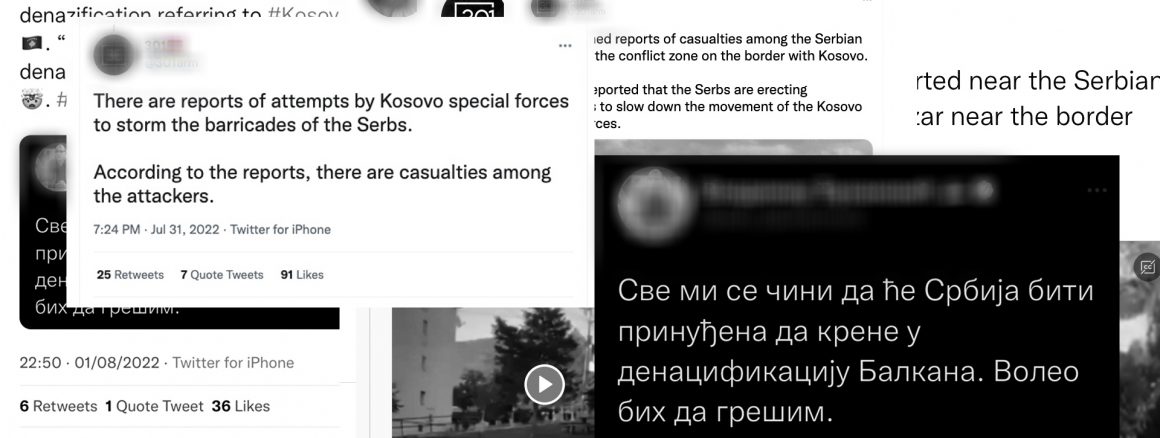Author: Ivana Jelača
MEDIA LANDSCAPE FILLED WITH PREJUDICE: Portrayal of Roma people in Serbian media
October 20, 2022
Roma people are usually only given space in the media when it is either World Roma Day or through media coverage of government support programmes for the Roma community. Even then, the reporting remains purely factual, without a deeper analysis and a critical view on the position of the Roma in Serbia.
Media reports fail to draw attention to the discrimination against Roma people in Serbian society, although their reality is filled with prejudice, discrimination, but also physical and racist attacks.
Additionally, when reporting on the Roma, there is very little space for positive stories, even on the public broadcasting service, which is financed by all citizens of Serbia, thus including Roma people.
“When we talk about reporting on the Roma population, it is inevitable to mention that reporters are insufficiently informed about the current position of the Roma. Also, when Roma people participate in “positive stories”, that is, when they participate in joint programs and when they fight together with the citizens of Serbia for a better society, the media does not recognise that the participants are Roma. However, when a negative story is conveyed, for example a theft, then, even though that information is not relevant, it is emphasized that the perpetrator is Roma. “This creates prejudice”, says Mihajlo Jovanović, an activist from the Roma Association of Braničevo district and the author of the Youth for Youth podcast.
The media plays a role in creating the image that shapes public opinion. However, media workers are also citizens who live in a certain society and therefore adopt the dominant narrative of that society. Mainstream media reporters rarely question their standpoints, and therefore run the risk of reproducing deeply ingrained stereotypes. When we report on marginalized groups (in this case the Roma), we must be aware of their position in society, the prejudice, and the stereotypes that exist in society, but also in our attitudes. “Roma are good musicians” is also a stereotype about the Roma community. Although it is not negative and does not directly cause harm, it nevertheless creates generalization of all members of one group. Generalisation of any kind contributes to building negative attitudes towards the whole group based on individual examples. In this way, when media, for example, report on theft and mention that the perpetrator is Roma, we get a generalised, negative attitude about all representatives of that community. This is precisely why the Code of Journalistic Ethics forbids mentioning the ethnicity of perpetuators unless it is essential to the story. However, the Code is violated on a daily basis.
Due to ignorance and deeply ingrained stereotypes, journalists can create a negative image when reporting, even when their intention is good. Exactly for that reason, it is important to create space for genuine Roma voices, but not just to speak about issues related to the Roma community but also on different topics relevant for all citizens of the society we live in.
Jovanović pointed out that young Roma men and women are working towards a more inclusive society, breaking down walls of misunderstanding, as well as informing citizens about the position of the Roma through the regional conferences Decade of Roma Inclusion,
In the media, there is almost no critical analysis of the government support programs for the Roma community, and the reporting is initiated by pseudo-events that promote state policy on the Roma and government support for the Roma community.
The media has a long way to go to replace factual reporting with a critical analysis of the position of the Roma community in society, the effectiveness of the implementation of the state’s minority inclusion policies, as well as issues of discrimination and racism. There are examples of good practice, but it is time for the mainstream media, more generally, to become more inclusive and provide a platform for those who have been silent for too long.
Author: Ivana Jovanović
Photo: Jorm S / Shutterstock
Article originaly published at mladi.org.rs
Monthly monitoring highlight: Homophobia and other hateful content throughout September
October 7, 2022
Throughout the month of September, the RDN monitoring team have detected a range of hateful narratives and discourse. This month, there has been a rise in homophobia, but other forms of hatred have also been detected.
Homophobia in Serbia and Albania
This month, there was a significant rise in homophobia in Serbia across both traditional and social media, as Belgrade hosted this years’ EuroPride. A number of openly hateful narratives and homophobic stances taken by the public, social media users, political figures, including many right-wing politicians, and religious figures contributed to the homophobic environment.
In Serbia, online portal Blic.rs published a headline reporting on the resolution which was taken by the Ministry of Internal Affairs to ban the Pride Parade set to take place. After an overwhelmingly negative reaction to this news, at the last minute, the Government came out and announced that there would now be police protection provided for participants of the Pride. This news effectively provided the green light for the event to proceed as planned. The article published by Blic.rs, highlighted the reaction of the European Union to the news about banning of EuroPride resulting in a stream of hateful, homophobic comments. Most of the comments circulated around the idea of members of the LGBTQ+ community being ‘sick’ and ‘mentally unstable’ as well as a number of comments using derogatory labels. The most extreme and hateful comments received an overwhelming number of likes in comparison to dislikes, revealing the support for these narratives and homophobic rhetoric. Portals like Blic.rs hold a responsibility to react to these homophobic narratives shared on their online platforms. By allowing the comment section to go unchallenged and uncontrolled, this only provides the space for the spread of homophobic and anti-LGBTQ+ narratives with their readers. Reporting on EuroPride showed many malpractices by the Serbian media, particularly tabloids, but also showcased how important public figures are as generators of hate speech. Bishop Nikanor of Banat, who was the August Troll of the month, is just one example of that.
Following the attack of eight Albanian activists who participated in EuroPride 2022, the media in Albania mostly reported on this event in a neutral manner. This however did not hold true for the comment sections on both the online platforms of traditional media, and on the online portals which were flooded with negative comments and narratives. The eight Albanian activists were attacked by Serbian far-right hooligans whilst on their way back from the event to their accommodation. Many of the comments regarding this incident were both homophobic and hateful, with a number of so-called ‘funny’ reactions to the events which took place. Some of these comments went as far as to legitimise and even spur on the violence perpetrated towards the activists including inciting to more violence against the LGBTQ+ community as a whole.
This incident resulted in a rare display of ‘brotherhood’ and unification between Albanians and Serbs, based on the discrimination and hate towards the LGBTQ+ community. Once again, this highlights the lack of responsibility and will of media outlets to moderate the comments section and discriminatory narratives which arise on their platforms. Incidents such as this highlight the lack of mechanisms in place which aim to prevent and restrict such hateful narratives from being shared online. Media outlets should be responsible for moderating comments and held responsible for all of the content that is shared on their platforms.
Islamophobia in Kosovo and Bosnia and Herzegovina
During an interview on popular TV channel, RTK, Albanian writer Mehmet Kraja made comments concerning the latest public debate in regard to the possible change in the Administrative instruction which would allow girls from the age of 16 to wear the hijab (also known as the headscarf) in schools. When discussing this, Kraja made several comments which held no factual basis or proof. He claimed that girls in Kosovo have problems with emancipation, especially when it comes to those who wear the hijab which affects their perception, limits them and restrains their freedom of thought and speech. Such strong sentiments, presented as fact but holding no tangible argument or backed up by the research, are both problematic and Islamophobic.
This comment made on public TV upset a number of people, including activist for the rights of women with headscarves, Nora Huseinovic, who announced a complaint against Kraje for his comments made during the interview. She furthermore demanded the resignation of Kraja from his current position as the president of the Academy of Sciences and Arts of Kosovo, on the basis of his use of hate speech and intolerance.
The debate surrounding the permittance of women above the age of 16 to wear headscarves in schools has been quite polarised with several individuals arguing in support of such a change on the basis of freedom of choice whilst on the other hand, others arguing that such a change would go against the Constitution of Kosovo.
Regardless of the ongoing debate, making public statements and accusations regarding the position of women who wear headscarves as being ‘limited and restrained’ is problematic and incorrect. Narratives such as these only spread Islamophobic outlooks on the position of women who wear headscarves and contributes to negative group labelling and stereotyping.
The negative impact of these comments goes beyond targeting Muslim community in Kosovo; they target women and perpetuate the assumption that women are intrinsically unable to make informed choices, particularly when it comes to them making free and legitimate decisions over their own bodies.
In Bosnia and Herzegovina, politician and Serbian member of the Presidency of Bosnia, Milorad Dodik, gave an interview for the Russian agency, Tass in which he discussed the current conflict in Ukraine. During this interview, Dodik justified the current invasion of Ukraine and even made problematic comparisons of the ongoing situation to that within Bosnia and Herzegovina. Dodik then went on to claim that it is not possible to “have joint schools and textbooks with the Muslims” when referring to Bosniaks.
This is not the first time Dodik has referred to Bosniaks as Muslims in public appearances, portraying the Bosniak community as a religious entity and stripping them of their ethnicity and position as members of the constituent peoples of Bosnia and Herzegovina. Political figures such as Milorad Dodik, who hold high public influence, should refrain from spreading such narratives. Making sweeping statements claiming that it is not possible to share public spaces such as schools with Muslims is not just Islamophobic, but contributes to already strong divisions within the Bosnian society on ethnic and religious grounds.
Ethnic discrimination in Montenegro and North Macedonia
During one of the sessions of the Herceg Novi Municipality Assembly, one of the members of the Democrats, Savo Niković, made extremely derogatory comments when referring to the Roma community. When addressing the audience, Niković commented on the workers of the utility company as arrogant and unnecessarily emphasised their nationality, describing them as “arrogant garbage collectors of Roma nationality”. Labels such as these are hateful and denigrating and uphold discriminatory connotations towards the Roma community.
According to the local NGO Young Roma, this comment is made with an intent to categorise the Roma as second-class citizens. Referring to the nationality of individuals during public addresses in such a way is unnecessary as it contributes further to the spread of negative group labelling of individuals. Narratives that rely on prejudices and stereotypes about the Roma community will go on to perpetuate a negative image of Roma inferiority.
Powerful and influential politicians such as Savo Niković have a responsibility towards the public to hold themselves accountable for their actions and words. All citizens and members of society should be treated equally and with respect, regardless of their ethnicity. Such prejudices run the risk of being picked up by individuals resulting in the mistreatment and hateful attitudes towards members of the Roma community, which is already severely discriminated against.
In North Macedonia, news made headlines regarding one of the largest Macedonian supermarket chains – Tinex – is said to be acquired by the Kosovo company Viva Fresh. Social media users on Twitter went on to spread hateful comments insulting Kosovo citizens with a range of insulting names and labels. Alongside this, online portal ‘Shqipmedia’ also reported on this incident, claiming that the supermarket chain was going to be bought out for around 90 million EUR – a statement with little to no proof. As soon as this news was published, many Macedonian outlets also reported on the matter, resulting in an outcry amongst Macedonian public and a surge of hate speech on online media.
Within North Macedonia, tensions between Macedonians and Albanians are well known, meaning that any information which is released and reported on in regards to Kosovo or Albanian companies entering the market is almost always faced with negative responses. Allowing such discriminatory and hateful comments to be posted with no consequence only further justified and fuels the ongoing tensions between both ethnic groups. This case highlights the lack of professionalism by the media within North Macedonia, who publish information such as these without factchecking beforehand. In highly sensitive political landscapes like in Macedonia, such headlines can only result in hate speech being disseminated by social media users. The media should report on information in a professional manner as a priority, and reject spreading disinformation in order to working against the spread of hate speech.
TROLL OF THE MONTH – SELECTION CRITERIA
October 3, 2022
The goal of the Reporting Diversity Network 2.0 monitoring is to identify and document the most significant cases (‘incidents’) of hate speech and divisive discourses in the Western Balkans media.
Incidents are defined by the speaker regardless of where they occurred, but monitoring refers to their media coverage. They can originate in the Parliament, party event or any public occasion, not necessarily being generated by the media, but have to be reported or spread out by the media.
The media can be traditional (television, newspaper etc.) or social media (Facebook, Twitter, Insagram, TikTok etc.) or combination of both.
The purpose of the monitoring is not a systemic overview of all the media in the country, overall media discourse, nor the content of selected media. The goal is to single out individual incidents of hate speech which are either reported or distributed by the media, investigate frequency of their occurrences and their major forms. Monitoring will identify who commits the incident but also how media transmit, amplify or critically counter the hate speech through their coverage.
Another equally important goal is to identify groups and individuals who are targeted in those incidents, what kind of hatred, insults and threats are they exposed to and what language is publicly used against them in various media settings and environments.
The Balkan Troll of the Month is an individual, a group of individuals or a media outlet that spreads hate based on gender, ethnicity, religion, or other diversity categories. The Balkan Troll is selected based on hate speech incidents identified across the Western Balkans region in that particular month.
The purpose of the Troll is to call out the most serious cases of hate speech and to expose the perpetuators in front of the public. We tend to inform the public on the reasons why the incident is problematic, and what the proper media representation should be.
Criteria to select Troll of the Month rely on monitoring methodology.
The monitoring focuses on the most significant ‘episodes’ of hate speech which can be identified as ‘incidents’. There are three criteria to select them:
First, they can be defined by the relevance of the person making the offence. State officials, political representatives, public personalities, people of authority or celebrities carry more weight and their speech is more consequential for the public opinion. Therefore the importance of the speaker determines the tone of public debate beyond the single incident.
Second, the incidents appearing across the media, either by being reported in many media or repeated though prolonged periods of time. Cases of viral hate speech, incidents that travel across media platforms or those with extended presence in certain media both have magnifying effects and therefore carry more significance than a random incident.
Third, public perception of the incident, its consequences, influence, harm, potential to cause chain reaction, be reprinted or become viral, adds to its significance even if the speaker would otherwise have been unnoticed. Due to rising importance of social media and its networking potential, certain incidents capture public attention and stir public sentiments by their inflammatory, intimidating and discriminatory nature amplified through comments and sharing.
In addition to the three above mentioned criteria, when selecting Troll of the Month sentiments that accompany the given incident is also taken into consideration.
Within sentiment analysis a score for each case should be given, except in situations when it is not feasible. The score ranges from 1 to 6, as shown in the table, according to the methodology of George Washington University. Pay attention: Not only can units of vocabulary have a hateful and non-hateful context, but language can be structured to communicate hateful context using sarcasm, double entendre, innuendo, euphemism, metaphor, and other forms of rhetorical obfuscation.
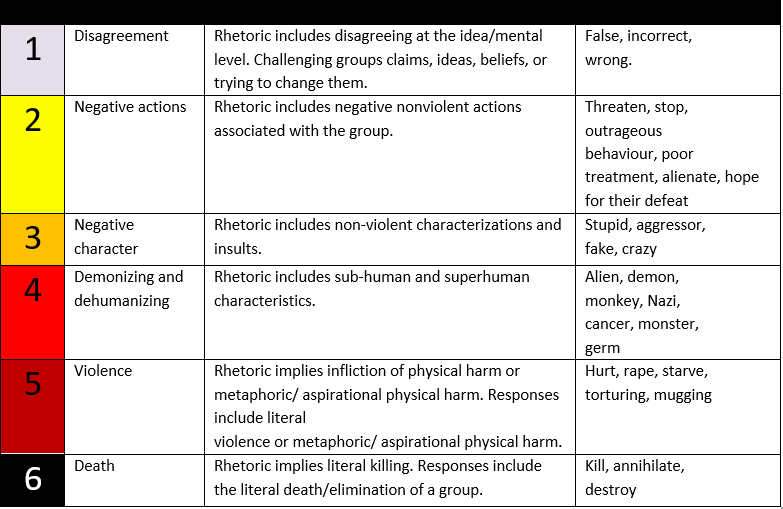
Based on the above criteria project representatives select three most serious cases, while the Troll of the Month is selected based on the votes of the project team members.
Each team member gives a vote to a single incident, and a Troll is selected based on the number of votes. In case there is an equal number of votes for two different incident, additional team member(s) is/are invited to vote.
TROLL OF THE MONTH: Savo Niković, a member of the Democrats in Montenegro
October 3, 2022
The Balkan Troll of the Month is an individual, a group of individuals or a media outlet that spreads hate based on gender, ethnicity, religion, or other diversity categories. The Balkan Troll is selected based on hate speech incidents identified across the Western Balkans region.
The September Troll of the Month is Savo Niković, a member of the Democrats in Montenegro who openly spread discriminatory and insulting rhetoric aimed towards the Roma community.
During one of the sessions held at Herceg Novi Municipality Assembly, one of the members of the Democrats, Savo Niković made extremely insulting and denigrating comments when discussing the workers of the utility company. During his speech, Niković openly called the workers of the utility company ‘arrogant’ and went as far as to unnecessarily emphasise their nationality. When referring to these individuals, Niković labelled them as “arrogant garbage collectors of Roma nationality”. According to the local NGO Young Roma, this comment is made with an intent to categorise the Roma as second-class citizens.
Several other NGOs spoke out in reaction to this incident, highlighting the level of discrimination and negative group labelling towards the Roma community. Making such statements, as well as unnecessarily referring to the nationality of individuals during public addresses is very problematic. Emphasising one’s nationality in an instance such as this contributes to the spread of negative group labelling of individuals. Narratives that rely on prejudices and stereotypes about Roma community, such as the aforementioned, perpetuate an image of Roma inferiority.
Spreading negative and hateful narratives surrounding Roma, runs the risk of reinforcing stereotypes and negative attitudes towards individuals based on their ethnicity. This often results in the stigmatisation and isolation of members of the Roma community, despite them being amongst Europe’s largest ethnic minority.
Politicians and individuals such as Savo Niković, who hold a position of power and influence over political agenda setting and the opinions of others should have a moral and legal responsibility to hold themselves accountable for their actions. Spreading hateful, insulting narratives when addressing an audience, only contributes to the spread of discriminatory rhetoric. These narratives could be picked up and reported by the media, which could result in the magnification of discrimination and hate directed towards the Roma community.
This is not the first case of discrimination towards the Roma community noted this year. As part of the Montenegrin Cultural Network campaign, for the project ‘Montenegro without division’, a promotional photo was published on the Network’s website. The photo itself depicted representatives from all national communities dressed in their traditional costumes, that is, all except for the Roma community. They in turn, were represented in their uniforms from the Public Utility Company. Many organisations as well as individuals spoke out in reaction to this incident and condemned the stereotypical, discriminatory representation of the Roma community. Indeed, by not providing traditional Roma folk costumes, this painted a disproportionate representation in comparison to the other individuals who all wore their own traditional costumes.
Beyond the two mentioned incidents and to a broader level, RDN 2.0 media monitoring did not found much content about Roma people. This phenomenon is known as ‘hate silence’. It is evident across the region that the Roma community is underrepresented in the media apart from certain incidents and events which most often bring negative publicity. The lack of representation in the media often reflects a deeper issue at hand whereby, the Roma community is overlooked in everyday practices as members of society and their social position is more than often ignored. One way of improving this is by increasing the number of Roma people in the newsroom and inviting members of the Roma community to share their stories and experiences thereby, providing them with a voice. The media should have an active role in counteracting negative labelling and discrimination aimed towards the Roma community as all citizens and members of society should be treated equally and with respect regardless of their ethnicity.
MEDIA DIVERSITY INSTITUTE AND REPORTING DIVERSITY NETWORK 2.0 AT FAŽANA MEDIA FEST 2022
September 16, 2022
For the past four years, every September journalists, media workers, academics and CSOs gather in Fažana, a small town in the Adriatic Coast, for the Fažana Media Fest, a multimedia journalism festival which has been proclaimed as a friendly home to journalists. MDI has been part of this festival for the past three years as co-organisers. This year’s theme was ‘Women and the Media’ a topic very close to our work as is evident from our projects and the stories we cover. Those in attendance had the chance to discuss, learn, and network from and with one another.
This year we hosted four panels where we presented the achievements of our Western Balkans project Reporting Diversity Network 2.0 which has been established with the objective to effectively influence media representation of ethnicity, religion and gender in the Western Balkans. The project is funded by the European Union, the Balkan Trust for Democracy, a project of the German Marshall Fund of the United States, and the Norwegian Ministry of Foreign Affairs in Belgrade.
MDI’s first panel started on Wednesday 7 September. ‘Are we all products on digital platforms?’ brought together Bojana Kostić (Pen to Paper), Anida Sokol (Mediacentar Sarajevo), Laura Becana Ball (Global Forum for Media Development), and Eric Heinze (Queen Mary University), and was moderated by Jovanka Matić (Institute for Social Sciences).
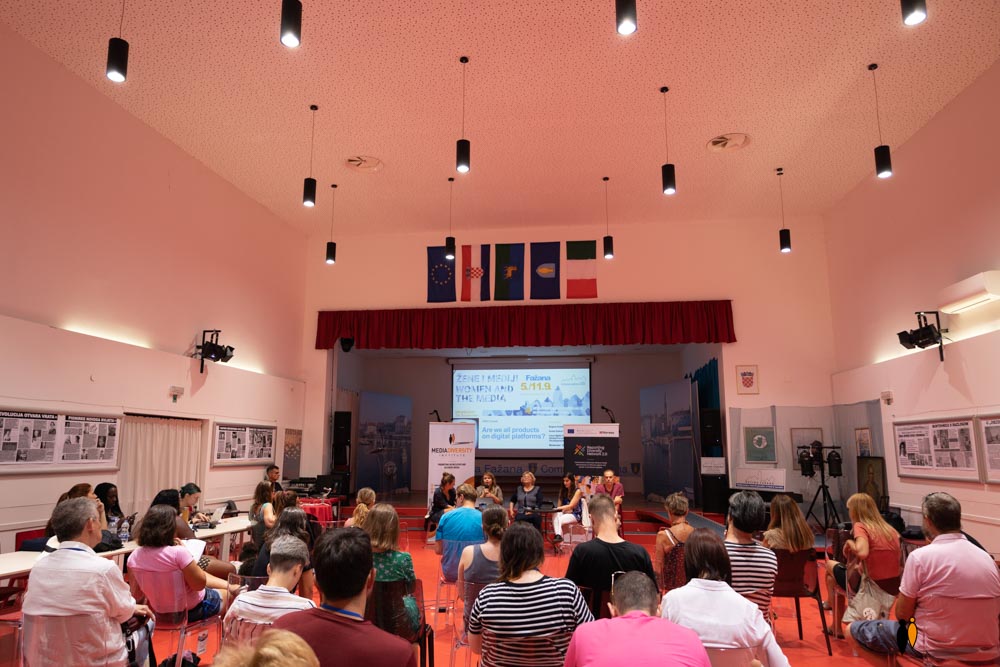
Two panels followed on Thursday 8 September.
During the first one Marina Kostova (SDK.MK), Ivana Jelača (Media Diversity Institute Western Balkans), Edlira Gjoni (Impact Centre) and Aleksandra Nikšić (BBC Serbia) discussed the ‘Position of Women in the Media’. The panel was moderated by Snježana Milivojević, Dean of Bayan College in Oman.
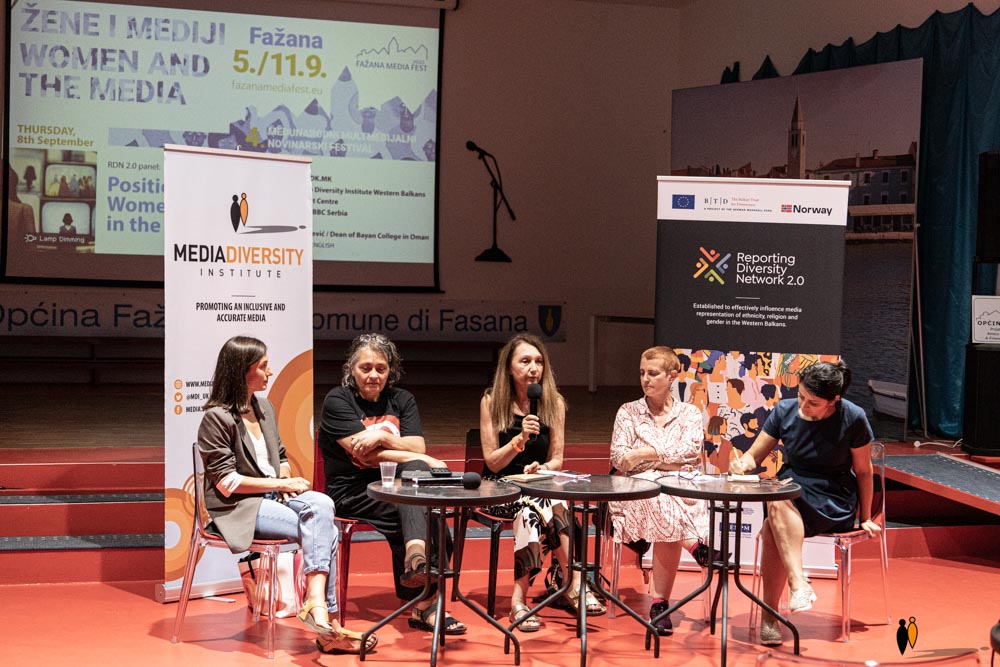
For the second panel of the day Maja Čečen (Director of Fund B92), Đurđa Radulović (Network of Journalists of Montenegro), Ognen Janeski (Council of Europe and European Union Western Balkans No Hate Speech Ambassador) and Valbona Sulce (Albanian Women in Audiovisual) talked about ‘The Media, Journalists and Violence towards Women’. The panel was moderated by journalists Maša Mileusnić.
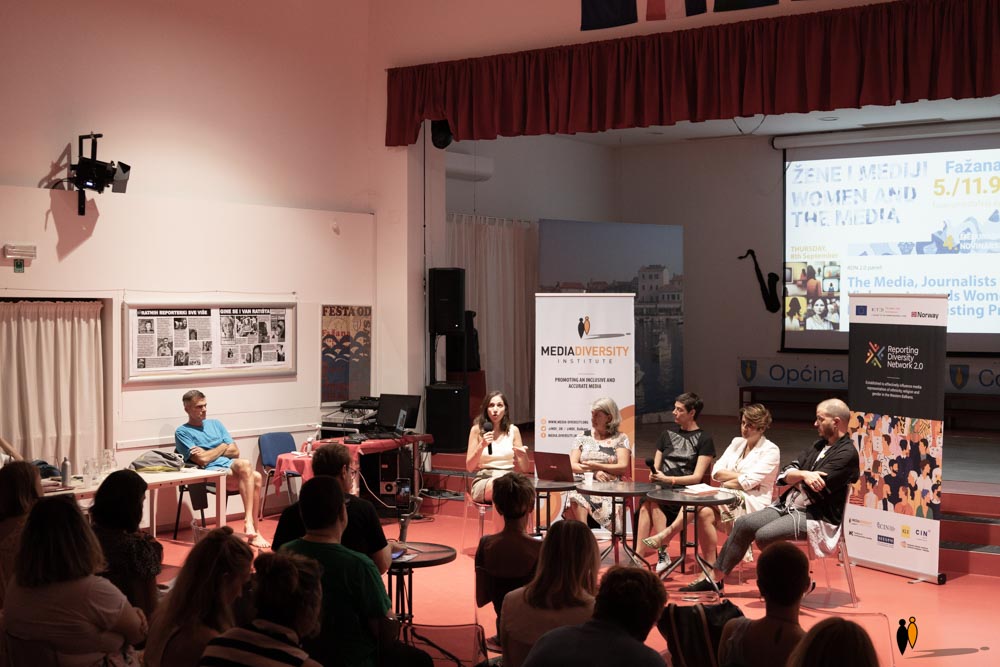
During the final day for our panels Jennifer Adams (Pen to Paper), Aleksandra Nikšić (BBC Serbia), Bogdan Banjac (Commission for Protection of Equality in Serbia), and moderator Violeta Simeonova Staničić (Head of the European Parliament Office in Croatia) took part in an engaging discussion about the ‘Representation of Women in the Media and the Improvement of Policies’.
In tune with our commitment to the improvement of the media’s portrayal of women and better treatment by their employers in the media sector, MDI and RDN 2.0 could not have been prouder to co-organise the Fazana Media Fest 2022. We look forward to the future of the festival.
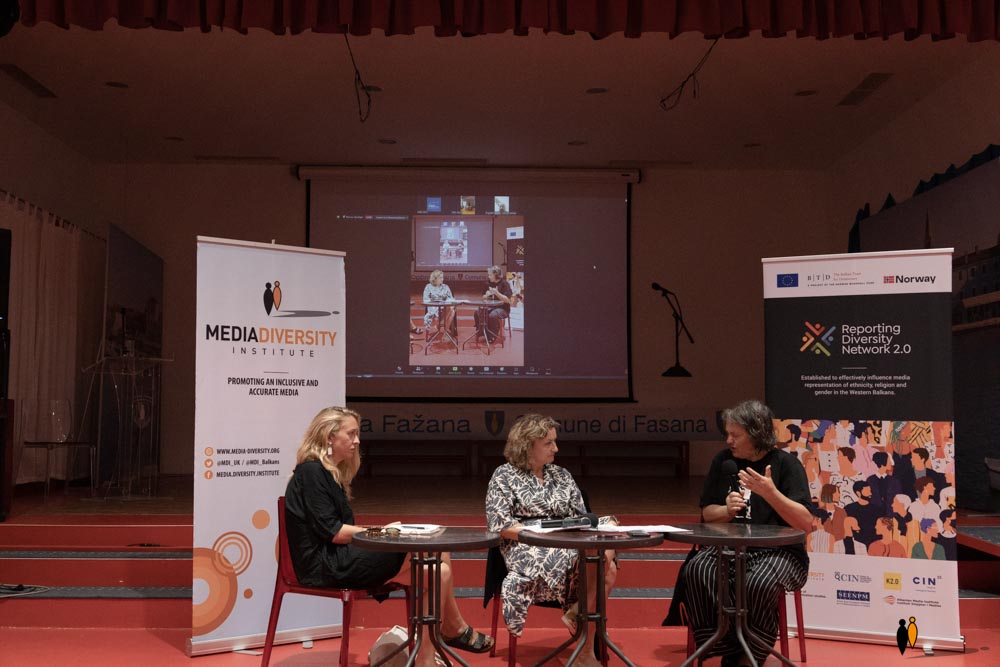
Monthly Monitoring Highlight: Homophobia and other forms of hatered throughout August
September 13, 2022
Throughout the month of August, the RDN 2.0 monitoring team has detected a range of hateful narratives and discourse. This month there has been a rise in homophobia, particularly in Serbia due to the upcoming EuroPride, along with sexism and ethnic discrimination.
Sexism in North Macedonia
The website express.mk published an article regarding singer Tamara Todevska in which it claimed that she was the former prime minister’s singer and that that was the reason why she was chosen to represent the country in Eurovision in 2019. Furthermore, the article claimed that when singing the national anthem, the singer purposefully forgot the part of the lyrics mentioning the name of Macedonian revolutionaries. The article also contained several remarks on her appearance emphasising that ‘only a few people can recognise her’ after publishing a photo of herself. The article went as far as to insult her career by adding that regardless of her aim to fix her mistake in regard to the national anthem, ‘her career did not get better’.
In addition to this, express.mk shared this article on their Facebook page with the title ‘After the North, nothing is the same as before’. This title provoked and prompted an avalanche of negative, personal and derogatory comments aimed towards Tamara Todevska.
Overly opinionated reporting of this kind which is not based on facts and truth can result in the creation of an environment of hate which spurs on negative attitudes and comments towards individuals.
Ethnic discrimination in Bosnia and Herzegovina and Kosovo
Antimigrant.ba, which has been the focus of RDN 2.0 highlights several times, is an extremely problematic website which shares discriminatory narratives in relation to migrants and refugees within the country. The portal often shares articles which contribute to the negative narrative which supports that an ‘overwhelming number of migrants are a ‘threat’ to the local community’. Their recent headline read ‘A migrant tried to kill another migrant, and he could have killed someone from Sarajevo’. This headline only contributes to the already present fearmongering discourse amongst Bosnians by placing a wedge between the local community and the migrant community with the dichotomy of ‘them’ versus ‘us’. The creation of a state of opposition between the two communities only contributes to the spread of discriminatory and prejudicial attitudes amongst them.
Headlines which hold little to no evidence for the claim, contribute to the spread of misinformation and disinformation and run the risk of spreading xenophobia. By assuming that such an event could have occurred to a local from ‘Sarajevo’ the headline creates a personalised aspect towards the issue by imposing the idea of a ‘threat’ to society.
Ragmi Mustafi, President of the National Council of Albanians in Serbia recently stated that there is no reason as to why Albanians from the south of Serbia have less freedom than Serbs who live in the north of Kosovo. On his Facebook profile he criticised Kosovo’s Prime Minister Albin Kurti’s speech during the visit of Serbia’s President Aleksandar Vucic. More specifically he pointed out that, among the six points that were made during that speech, Albanian’s in Presevo should share the same rights as Serbs in Northern Kosovo.
This information was picked up and reported on by the website ‘Kosovo Online’ resulting in an accumulation of hundreds of comments and hate aimed towards Ragmi Mustafa. Albanians who live in three South Serbian municipalities, specifically in the region of the Presevo Valley, believe that their basic human rights have been violated. Representatives of political parties have continuously vouched for their involvement in the negotiations in Brussels in order to improve this situation.
Websites such as ‘Kosovo Online’ which report on sensitive stories that are later shared on their Facebook pages, create a platform which is filled with insulting comments and spread hate speech. News websites, similar to more traditional media should adhere to the Code of Ethics and should pay more attention to their method of reporting and they should moderate their comments sections in order to prevent hate speech.
Homophobia in Serbia and Albania
Milica Đurđević, a Serbian MP of the right-wing movement Zavetnici, recently appeared to Kurir TV’s morning show where the topics of EuroPride and the relations between Serbia and Kosovo were discussed. When talking about the recent events in Kosovo, Đurđević questioned the necessity of the EuroPride and suggested that the country has more important matters of ‘national interest’ to pay attention to rather than hosting of EuroPride. When referring to the recent events in the northern region of Kosovo, she reiterated the importance of this situation and the need for protection of the Serbian people. Đurđević went on to question whether it was necessary for the Police to protect those individuals who – according to her – merely act as ‘provocation’. She emphasised how the focus should rather be on the protection of the people and Serbia itself, in alignment with the priorities of national interest.
The latest developments between Serbia and Kosovo were connected to and misused against the EuroPride. Those who used such arguments dismissed the importance of the EuroPride and emphasised on the situation in Northern Kosovo. This has brought a lot of turmoil in the country. Many far-right politicians have expressed their dismay of the event taking place in mid-September and there have even been protests taking place in the capital. By allowing such rhetoric and comments on the morning programme of Kurir TV, only reinforces the existing prejudices against the LGBTQ+ community and leaves space for the spread of negative attitudes towards it.
In Albania, the popular meme page Brryli Broadway made a meme juxtaposing images of two well-known individuals, one the LGBTQ+ activist Xheni Karaj and the other the moderator Bledi Mane. The meme focused on mocking the individuals’ hairstyles which are similar. It depicted both of them but identified Xheni Karaj as Bledi Made and vice versa. Despite the humourous purpose of the meme, it alluded that both of them are queer and that they can both be identified with a different gender. The meme itself is problematic and mocking, as it contributes to the perpetuation of the stereotype that queer women look like men, while men with hairstyles that are different from the ‘masculine norm’ are said to look like women.
Accompanying this meme, was a number of homophobic and hateful comments aimed at both individuals. The comments section which is not moderated, provides a space for hate towards both individuals and the LGBTQ+ community. Posts such as this meme are used to invoke humour whilst simultaneously mocking individuals. They provide a space for the spread of homophobic rhetoric and should be removed and should not be posted on social media. Furthermore, social media platforms such as Instagram should have a duty and role to remove such content and comments from the platform according to their community guidelines for hate speech.
Misinformation in Montenegro
During the TV Pink’s morning show ‘Novo Jutro’, the host discussed and revealed the ‘exclusive’ information and motive behind the killing of ten people in Cetinje. Viewers in Montenegro could watch the program via Pink M television. The morning programme reported on this tragedy by speculating the causes of the accident. Indeed, unlike most media within Montenegro, the way that TV Pink’s morning show reported on this event was extremely unprofessional and unethical.
In reaction to this, the Civic Initiative ‘21 May’- an informal and democratic movement of free Montenegrin citizens who aim to defend the liberal values of the country – requested the Agency for Electronic Media to blackout the content of TV Pink for at least a year. They supported this claim with the argument that the programme itself frequently spreads hate speech.
Media such as TV Pink and their programmes have a moral and legal obligation to report in a professional manner in alignment to ethical and journalistic standards of practice. By reporting in such a sensationalistic manner, they contribute to the spread of harmful disinformation. Furthermore, such reporting contributed to the distress of the victims, families and friends of the tragedy as this news spreads media viewership by unethically speculating about the potential motives of the incident.
As a result of this case, TV Pink Montenegro morning programme has been banned for 6 months in Montenegro, which is an important decision showing that despite a lot of ethnic tensions were allowed on air in Montenegro, Regulatory Body reacts at least to some.
TROLL OF THE MONTH: Bishop Nikanor of Banat
September 2, 2022
The Balkan Troll of the Month is an individual, a group of individuals or a media outlet that spreads hate based on gender, ethnicity, religion, or other diversity categories. The Balkan Troll is selected based on hate speech incidents identified across the Western Balkans region.
RDN’s August Troll is the Bishop Nikanor of Banat who openly spread hateful narratives and incitement to violence towards those attending and participating in this year’s EuroPride hosted in Belgrade.
Earlier this month, a number of videos emerged on social media depicting Bishop Nikanor of Banat making a speech directed at the public in regards to his views and thoughts on EuroPride. Nikanor publicly shamed and condemned all those in favour of participating, organising and involved in this year’s EuroPride which will take place in Belgrade in mid-September.
Bishop Nikanor addressed the public with extremely hateful and problematic statements including insulting and derogatory comments towards the Prime Minister of Serbia, Ana Brnabic, and first openly gay person to hold the office. In addition, he openly called for the use of violence and physical action towards those taking part and participating in EuroPride. Nikanor expressed how he would be amongst the first to stand up against the EuroPride, claiming that he would “curse anyone who preached this”, and that he would use weapons against them if he had them.
EuroPride is one of the largest European events for the LGBTQ+ community and an important milestone for the LGBTQ+ community in the whole region – it is an event marking the respect for equality and shared rights for all, regardless their sexual orientation or gender identity. An event promoting the empowerment of individuals, shared values, respect and love. Nevertheless, not everyone is equally as supportive of this event and many politicians, religious actors and members of society have publicly expressed their dismay at the hosting of such an event in the city of Belgrade.
In reaction to the calls for violence and hateful narratives spread by Bishop Nikanor of Banat, a number of media outlets picked up and reported on this incident including a large number of social media users who expressed their shock. Furthermore, the Commissioner for the Protection of Equality – Brankica Janković – made a public statement condemning the Bishop’s actions, rightfully highlighting his extremely problematic statements and calls for violence against members of the LGBTQ+ community. Janković furthermore, highlighted the divide between the Church and public matters as well as not standing in the way of democratic values.
On the other hand, others took this as an opportunity to continue to show their objection to hosting of EuroPride in Belgrade which resulted in an increase of problematic and discriminatory statements spread by public figures. These incidents only further contributing to the existing hate environment.
Discrimination is considered an act of denial of an individual’s right to convey their values in accordance to their beliefs. However, under Article 18 ‘the prohibition of religious discrimination’ of the Serbian Law on the Prohibition of Discrimination it is clearly stated that the Church itself is exempt from this law. The passage reads:
“behaviour of priests or religious officials that is in accordance with the religious doctrine, belief or goals of churches and religious communities (…) is not considered discrimination”.
In other words, given that the Church is exempt from the Serbian Law on the Prohibition of Discrimination, it is extremely difficult for actors and institutions to act upon such cases and hold individuals accountable for the spread of hateful narratives and calls for violence aimed at the LGBTQ+ community. Such lack of institutional mechanisms of response, allows for Church representatives and members to openly spread hateful and discriminatory narratives with full legal immunity.
This is not the first time a religious figure has publicly interfered in public matters. Three months ago, the Metropolitan of the Serbian Orthodox Church in Montenegro, Joanikije Mićović spoke in support of the recent initiative by the American Supreme Court, wishing to overturn abortion rights in the United States. Nevertheless, the fact remains that the church is a separate institution and therefore, should not interfere within public matters or stand in the way of equality, freedom of choice and rights for all.
Reporting Diversity Network 2.0 strongly condemns any type of hate speech aimed at the LGBTQ+ community. Spreading such hateful narratives poses a direct threat towards the LGBTQ+ community and further creates a divide in society. Media should also take a critical stand when reporting on such incidents and keep in mind their educational role and obligations in accordance with the Code of Ethics.
Individuals spreading such narratives, regardless of their religious affiliation should be held accountable and responsible for their actions and behaviour.
WAR MONGERING AND RACE BAITING
August 26, 2022
SERBIAN TABLOIDS PROCLAIM WAR (ALMOST 300 TIMES A YEAR)
In September 2020, the Guardian editorial board had GPT-3, artificial intelligence (AI) language software, draft an essay about how robots “come in peace” and that humans have no reason to fear them. The result was incredibly successful; GPT-3 delivered a roughly 1,000 word text that put forward some good arguments.
If an AI program were to be trained for a journalism job in Serbian, an optimal assignment would be set up differently. Instead of robots coming in peace, the software should write a text about Albanians who come to make war. There are several reasons why this, in a technical sense, would be an ideal assignment.
First, a large corpus of pieces on the matter has been building for years, so the software could extract the existing elements and combine them and retell the story. Second, the lexical range of such pieces is very narrow. The software would not need to struggle with a large number of words; common phrases, figures of speech and insults would suffice. Third, and perhaps most importantly, these media pieces are very predictable and follow a template, structured like a fairy tale. An algorithm would be able to recognize and learn the ropes of this mechanism very easily, and then independently produce front-page pieces for Serbian tabloids like Informer, Alo, Srpski Telegraf and others.
If we look at how Serbian tabloids reported on the crisis in the north of Kosovo on July 31, we’ll see this sort of thing. It’s a long-running approach to reporting: a study from 2016-2017 found that Informer and Srpski Telegraf’s front pages announced the outbreak of a total of 265 wars in a single year. In other words, five announcements of war per week with a symbolic “weekend” bringing respite from “nuclear strikes,” “terrorist attacks,” “Greater Albanian aggression,” “total assaults,” “head-on clashes,” “bloody massacres,” and so on.
How does all this affect the audience? We can think about it in two opposing ways. The first is that, owing to the long-term exposure to threats that fail to be carried out, big words are beginning to lose power, so readers become anesthetized and read about upcoming invented wars as they do about an earthquake in East Timor. At the same time, we may have a public readership that is turning militant, scared, a public that is living in constant alarm about armed conflicts.
Since Albin Kurti came into power, tabloid articles about new conflicts breaking out in Kosovo have intensified. In February 2020, an Informer headline read: “Madness in Prishtina: Kurti is preparing for war.” The corresponding article claimed that “the newly elected president of the government of the fake state Kosovo is openly preparing for a war with Serbs and Serbia.” The most widely circulated Serbian newspaper spoke in this way in reference to Kurti’s inaugural address, where he in no way, shape or form announced a war, neither with Serbs, nor with Serbia or with any other country.
On October 15, 2021, several media outlets reported that “Kurti is preparing a new attack.” When? “As early as tomorrow.” No attack took place, but a new announcement came less than two weeks later when Kurir and Alo reported that “Kurti is preparing new bloodshed” scheduled for November 6. November too passed without an armed conflict, so the war was “postponed” for the holiday season. Instead of good wishes, Alo informed its readers that “Kurti is preparing a new attack on Serbs for New Year’s.” Kosovo Serbs welcomed the New Year in peace, but one with a limited duration because, as Srpski Telegraf reported, “Kurti is preparing a bloody Christmas for Serbs.”
One of the narrative devices these stories rely on is sudden claims of victorious conversion and treasonous betrayal. Thus you get things like Informer’s owner renting out a billboard to put up the message “Trump, you Serb,” followed by the newspaper’s reassurances that Donald Trump would return Kosovo to Serbia. But shortly after, when Trump met with Kadri Veseli, the former U.S. President abruptly changed national identities on Informer’s front page: “Trump is a Šiptar!” In a similar manner, in early August local tabloids celebrated “Serbia’s diplomatic victory.” Supposedly the U.S. and Albania took Serbia’s side (Alo: “Vučić turned the U.S. against the Šiptars,” and Kurir: “Albanian Prime Minister Edi Rama had clear message for Prishtina — Open Balkan or war”).
Tabloid pieces are characterized by an absence of any truthful analysis. There is no cause or effect, background or insight; everything boils down to emotions, primarily anger and fear. In such pieces, the insulting slur “Šiptar” is no longer only for Albanians, it becomes a universal label for anyone working “against Serb interests.” So besides Donald Trump, leaders of EU countries, activists or journalists from Serbia and opposition politicians all get labeled as “Šiptars.”
THE INFORMER FRONT PAGE ON AUGUST 3 READ: “OBJECTIVE OF THE WEST: KILL VUČIĆ IN KOSOVO.”
When working out the angle of a story, first the stance of Serbian President Aleksandar Vučić is determined. And that stance — regardless of whether it’s offensive or defensive, right-leaning or left — is presented as the saving grace, protective, deliberate and wise. Once oriented thusly, the rest of the story is crafted so that narrative, factual and stylistic context aligns with the pattern set by the president.
But that doesn’t mean that the media discourse stays where Vučić sets it. On the contrary, tabloid discourse is always more intense, heated and explicit. Within this system of information circulation, every story is heard twice: first in press conferences held in the presidency and later in media, where it is retold and enhanced. The experience of reading about crises in Kosovo has taught us that it’s only a matter of time before a story about Kosovo Serbs becomes a story about the president. And we didn’t have to wait long this time. The Informer front page on August 3 read: “Objective of the West: Kill Vučić in Kosovo.”
A 2021 report from the OSCE about the rights of non-Albanian communities in Kosovo states that although ethnic tensions have settled over the last decade, ethnically-motivated incidents targeting Serbs or the physical markers of Serbian language or culture are still regular occurrences. The most frequent instances are petty thefts and property damage, hateful graffiti, and the vandalization of Serbian Orthodox cemeteries. With this in the background, the tabloid headlines and narratives only heighten tensions further.
So it’s clear that articles about “hell in Kosovo” and “Serbia’s diplomatic victories” cannot be read in the same light by a Serb from Sremska Mitrovica and a Serb from North Mitrovica in Kosovo. Couple all this with air raid sirens, barricades and the sound of bullets and one thing becomes clear: this is the perfect timing for fear-mongering.
Though the tabloids present themselves as “standing with the people,” it’s clear that they feed themselves on this fear-mongering, that they cultivate it and make money from it. This form of pleasure is described in “Crime and Punishment,” when the half-dead colonel Marmeladov is carried into his apartment, while his neighbors, in Dostoevsky’s words, “pushed their way back towards the door, with that strange feeling of satisfaction which is always observed in people even when a sudden misfortune befalls those who are closest to them.” There is a German word for pleasure stemming from trouble: Schadenfreude.
If a Serbian variant of the GPT-3 software were tasked with writing an announcement about the coming “war in Kosovo,” it would probably, on the basis of simple instructions, create a text that no Serbian tabloid journalist would be ashamed of. The only difference would be that the software, unlike a journalist, wouldn’t feel that sudden surge of satisfaction as it announced an apocalypse.
Author: Stefan Janjić
Photo: Kosovo 2.0
This article was originally produced for and published by Kosovo 2.0 within the framework of RESILIENCE project. It has been re-published here with permission.
THE MEDIA ESCALATED THE SITUATION
August 26, 2022
INSTEAD OF OPPOSING INFORMATION CHAOS, SOME KOSOVO MEDIA OUTLETS CREATED IT
On June 29, 2022, the Kurti government took the decision to apply reciprocity measures against Serbia regarding personal identification documents. This meant that citizens of Serbia entering Kosovo, from August 1, would be provided with temporary forms replacing the documents issued by Serbia, a measure that has applied to citizens of Kosovo entering Serbia since 2011.
This decision caused a considerable reaction in the north of Kosovo. On the evening of July 29, groups of people blocked the border crossings at Jarinje and Brnjak with barricades and protests. A similar reaction occurred in September 2021, following the implementation of a measure requiring every vehicle with Serbian license plates entering Kosovo to replace the plates issued by Serbia with temporary ones — this too was an attempt to implement reciprocity measures with Serbia.
Kosovo and Serbia have continued the dialogue for the normalization of relations with mediation from the European Union (EU) since 2011. These blockades and protests are indicators that both countries have a long way to go towards normalization.
On the eve of the implementation of the decision regarding identification documents, Serbian President Aleksandar Vučić declared through the Russian agency Tass: “The situation for our people in Kosovo and Metohija is very difficult. We have never been in a more difficult position than today. The Prishtina regime is trying to use the situation in the world, as the new Zelensky, represented by Albin Kurti, declares war on hegemony. The actions to ban Serbian documents begins tonight at midnight.”
In response to the increasingly tense situation, the prime minister of Kosovo, Albin Kurti, and other state officials met with the American ambassador in Prishtina, Jeffrey Hovenier, who forwarded a request from the United States government to postpone the implementation of the measures for one month due to “misinformation, misunderstanding and disinformation regarding this decision.” The Kurti government pledged to postpone the implementation until September 1, 2022 and as a result, the barricades were withdrawn.
However, the time between July 31 and August 1 was enough for the incident to reach front-page headlines in local, regional media and beyond. The matter was widely addressed and written about from different perspectives. However, the news delivered to the public was often one-sided and unconfirmed.
NARRATIVES OF WAR AND CONFLICT
One of the initial articles produced in Kosovo after the formation of the barricades purported that a member of the Kosovo Police was injured while on duty in the north. This misinformation drew significant reactions from social media users.
Organizations that deal with fact-checking in Kosovo for Facebook soon evaluated this news as untrue. The Kosovo Police denied the news. Then Berat Buzhala, on behalf of Gazeta Nacionale, the online news outlet which had published the article in question, apologized for the mistake and for misreporting.
However, the general coverage of events nurtured narratives of conflict.
Many of those who compiled and spread this news focused more on predicting what might go wrong than on reporting the facts. As a result, the media atmosphere was influenced by unconfirmed information coming from posts on social media, in some cases made by anonymous accounts. Even journalists who reported on the scene often started their coverage by referring to this information.
Eyewitnesses are reliable sources for journalists, but they are not necessarily sources that reflect events as they happen. The eyewitnesses on the southern side of the barricades see the incident only from where they stand and therefore their perspective of events is limited, the same thing applies to eyewitnesses on the northern side.
By using posts on Twitter and Facebook as sources, journalists, in addition to over-simplifying the situation, “others” people and helps further deepen the narrative of “us” and “them.” Othering fuels conflict. By constructing a divide it denies the humanity of a person or group. Consequently, those who are seen as “others” are considered less worthy of dignity and respect.
Journalists in Kosovo should be familiar with covering these kinds of incidents. Since there have been several similar crises, journalists should be prepared to handle information with caution. Carelessness in such cases can lead to or facilitate further tensions, as happened in 2000 and 2004 in Kosovo.
The first instance is commonly known as the “Dita” case. In 2000, the newspaper Dita published the name, home address, photograph and work schedule of a Kosovo Serb, Petar Topoljski, and accused him of participating in war crimes. Two weeks after the publication, Topoljski was found murdered. As a result, the United Nations Mission in Kosovo (UNMIK) shut down the newspaper. The investigations, despite having continued for years, have not resulted in the arrest of the perpetrators or a confirmation of the charges.
The second case occurred in March 2004, when after the tragic drowning of three Albanian children in the Ibar River, information was given to the public broadcasting network (RTK) by a child who had witnessed the incident. The child claimed that some local Serbs had attacked him with dogs, a claim which was never verified by journalists. In some of the coverage of this incident, journalists reported sensationally and carelessly. In the heated days that followed, massive anti-Serb riots broke out across the country.
A 2004 report by the Organization for Security and Co-operation in Europe (OSCE) stated that if the reporting hadn’t included excessive emotion, prejudice, carelessness and “patriotic” duty, events might have taken another course. Adding that events might not have reached the same scale and level of brutality or might not have happened at all. Moreover, the accusations raised by the reporting have never been verified and no one has been held accountable.
Although this time the news of the police officer’s injury was quickly denied and the media apologized, the false claim spread fast and its presence on various platforms multiplied, increasing its opportunity to influence readers. Although there were no other consequences, it is important to consider how the two above cases demonstrate that misinformation can escalate the existing situation.
THE INFLUENCE OF SOCIAL MEDIA
Social networks played an essential role in shaping the reporting and understanding of the events of July 31 and August 1. Aside from the fact that these platforms served as a space to express support and to share information, they also became channels of political communication and a source for the media.
Twitter and Facebook became an essential source of information for both Kosovars and the international audience. In Kosovo, they became information platforms and spaces to express political support for the actions of the Kosovo Police. In fact, a whole campaign using photos of the Kosovo Police was launched as a sign of support for the Kurti government’s decision. Journalists also joined this campaign.
Some journalists in Kosovo, in addition to their usual role, took on the role of activists. Journalists began to openly support the actions of the police and this was also reflected in their reporting. As a result, unverified and biased news was spread to the public in Kosovo. Journalism in the entire Western Balkans is witness to this phenomenon.
In addition, political actors, such as representatives of the Russian and Serbian governments, used these platforms for political communication, further increasing the significance of social networks in the reporting of this event. The hashtag #Kosovo was used to comment on the events in Kosovo and then comparisons started to be made to the war in Ukraine.
Roughly 15 minutes after the reaction from the President of Serbia, the Russian Ministry of Foreign Affairs made an announcement on the messenger application Telegram supporting Vučić’s narrative about the “injustice and persecution of the Serbian population in Kosovo.” The Kosovar government’s statements for international and local audiences claimed Russian influence in these events. Prime Minister Kurti reiterated this position in an interview for the Italian newspaper la Repubblica. These public claims of Russian involvement drew the attention of those concerned with the war in Ukraine
A sample of 10,000 tweets about the events in the north of Kosovo was gathered by Twitter for the two day duration of the crisis, July 31 and August 1, the sample was then analyzed with software for qualitative and quantitative analysis (MaxQDA). The research found that “Kosovo” was mentioned 8,935 times and the word “Ukraine” was mentioned 895 times. These findings show that in about 10% of the communication about these events, Ukraine was also mentioned. The word “Putin” was mentioned 780 times and “Kiev” 700 times.
It is interesting to consider the origins of these tweets. About 1,000 of the 10,000 tweets and retweets came from India, while the second highest number came from Ghana.
It seems suspicious that so many of the tweets about the events originated in India, Ghana, Italy and Spain. These likely bot farms are used to fabricate posts on Facebook and Twitter and they’re sophisticated; their locations can be shielded and encrypted through virtual private networks (VPN). Similarly, it seems suspicious that the reaction from the government of Serbia, including Serbian President Aleksandar Vučić and Minister of Interior Affairs Aleksandar Vulin, were closely followed by reactions from the Russian Ministry of Foreign Affairs.
These reactions on digital platforms were followed by posts and reposts from a host of users, but there was an anomaly in that about 25% of users were on computers and not smartphones, raising suspicions of an attempted influence campaign. It is much easier to operate multiple accounts on computers rather than mobile devices. With so many reactions on social media platforms, the topic trended for a while.
The “Twitter war” about the north of Kosovo created an excellent self-promotion opportunity for self-proclaimed “conflict experts.” Social media users who are active in commenting on the war in Ukraine, briefly turned their attention to the “war” in Kosovo. The media and social networks are a perfect environment for the cultivation of these supposed experts who make inflated claims about their sources or authority.
After a while, these “experts” strategically behave as such. In the case of Ukraine, such experts came into prominence around 2014, when the Russian Federation began annexing Crimea. When journalists quoted these sources about events in Crimea and Eastern Ukraine, many were mid-ranking government officials, and after eight years, they are seen as more reliable, having built up experience and a large network of collaborators.
Countless users from EU countries and elsewhere began to explain the problems in the north of Kosovo, equating it with eastern Ukraine and Russia with Serbia. The political leadership in Kosovo and Ukraine shared these sources of information, increasing their relevance.
The journalists who warned that the situation had “escalated” had no verified information. Many news stories in Kosovo were built on misconceptions about the events in the north of Kosovo based on the reports everyday people provided on digital platforms. This resulted in poor and biased coverage of events. While diversity of opinion is welcome, the media should be careful who and how they make use of quotes.
Nowadays, in a world facing information chaos and the increasing influence of information warfare, the objectivity of journalists’ information gathering methods is more important than ever. Journalists must equip themselves with specialized knowledge on how to verify images and texts from digital platforms in order to be better informed on propaganda strategies and deliberate misinformation from dubious sources. Accurate information must be a professional imperative.
Author: Abit Hoxha
Photo: Kosovo 2.0
This article was originally produced for and published by Kosovo 2.0 within the framework of RESILIENCE project. It has been re-published here with permission.
